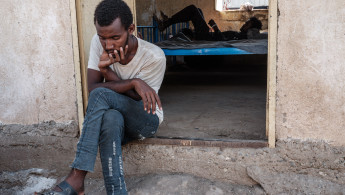HRW slams Egypt's 'forced return' of Eritrean asylum seekers
Human Rights Watch on Thursday condemned the "forced return" by Egypt of Eritrean asylum seekers, saying such measures put the deportees at risk of arbitrary detention and torture in their country.
The New York-based watchdog said Egypt had deported 24 Eritreans, including children who were not registered with the United Nations refugee agency (the UNHCR), on December 24.
"Egypt should stop forcing Eritreans to return to a country where they face serious risks of arbitrary detention and torture and allow them full access to asylum procedures," said Joe Stork, HRW's deputy Middle East and North Africa director.
In November, UN human rights experts deplored Egypt's expulsion of seven Eritrean asylum seekers including five children "despite the risk of enforced disappearance, torture and ill-treatment".
The experts had said in a statement that Egypt's move was "in violation of international human rights obligations".
HRW accuses Egypt of carrying out "arbitrary arrests and detention of asylum seekers, refugees, and other migrants" as well as denying some detainees access to the UNHCR.
It said such measures suggest other Eritreans in Egypt "face a high risk of deportation".
The rights watchdog said it had documented the months-long arbitrary detention in Egypt in poor conditions of nine Eritrean asylum seekers, including children.
Some of them were deported in December while the rest remained in detention, it said.
The UNHCR has recorded around 21,000 Eritrean refugees in Egypt until the end of last year.
There are no statistics on unregistered refugees in the country.
President Abdel Fattah al-Sisi has said Egypt hosts around "six million people who came to the country due to ongoing conflicts or the magnitude of poverty in nearby countries."
"We do not call them refugees," he told a forum held this month in the resort city of Sharm el-Sheikh.
"They are integrated into our society, they eat and drink, they receive (medical) treatment and whatever (resources) we have are made available to them."
bur/mz/dv





 Follow the Middle East's top stories in English at The New Arab on Google News
Follow the Middle East's top stories in English at The New Arab on Google News
![Both Hamas and the Palestinian Authority welcomed the ICC arrest warrants [Getty]](/sites/default/files/styles/image_330x185/public/2024-11/GettyImages-2178351173.jpg?h=199d8c1f&itok=TV858iVg)

